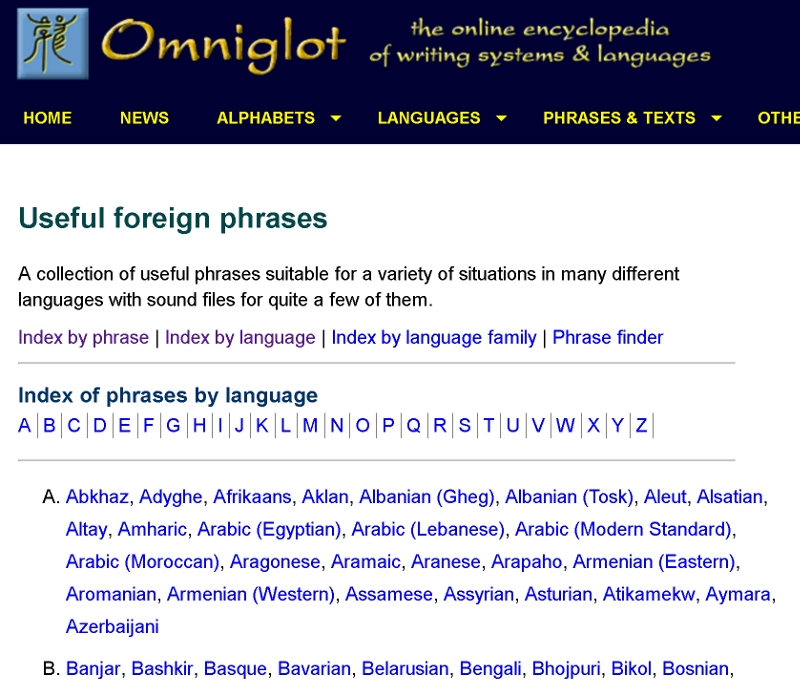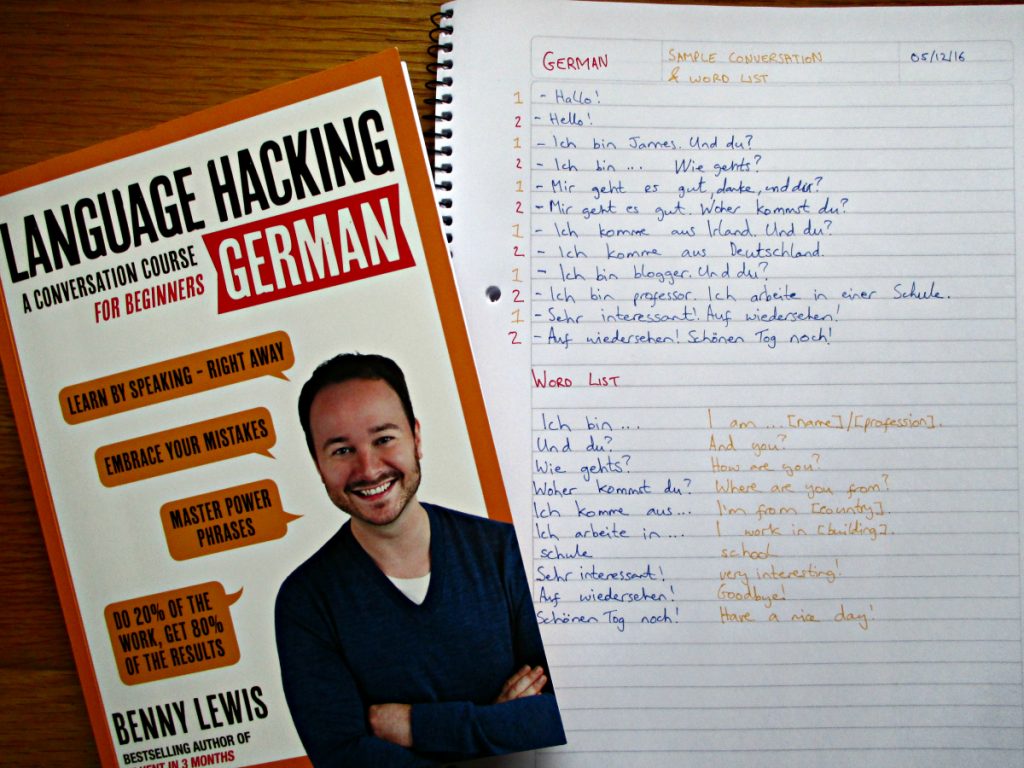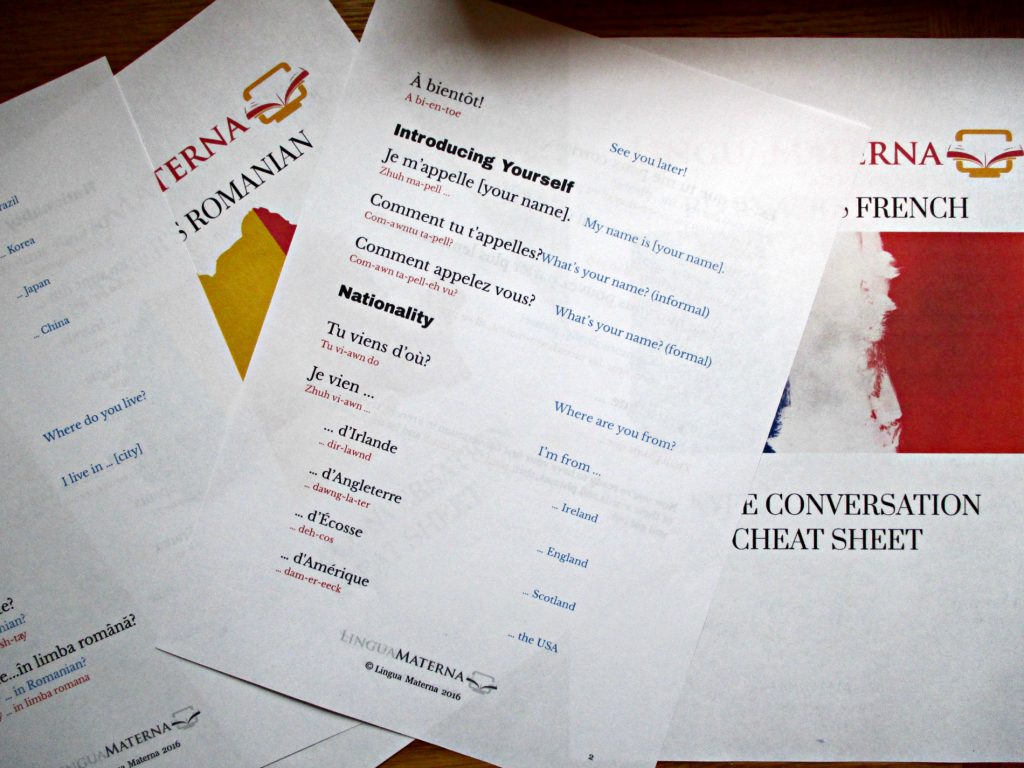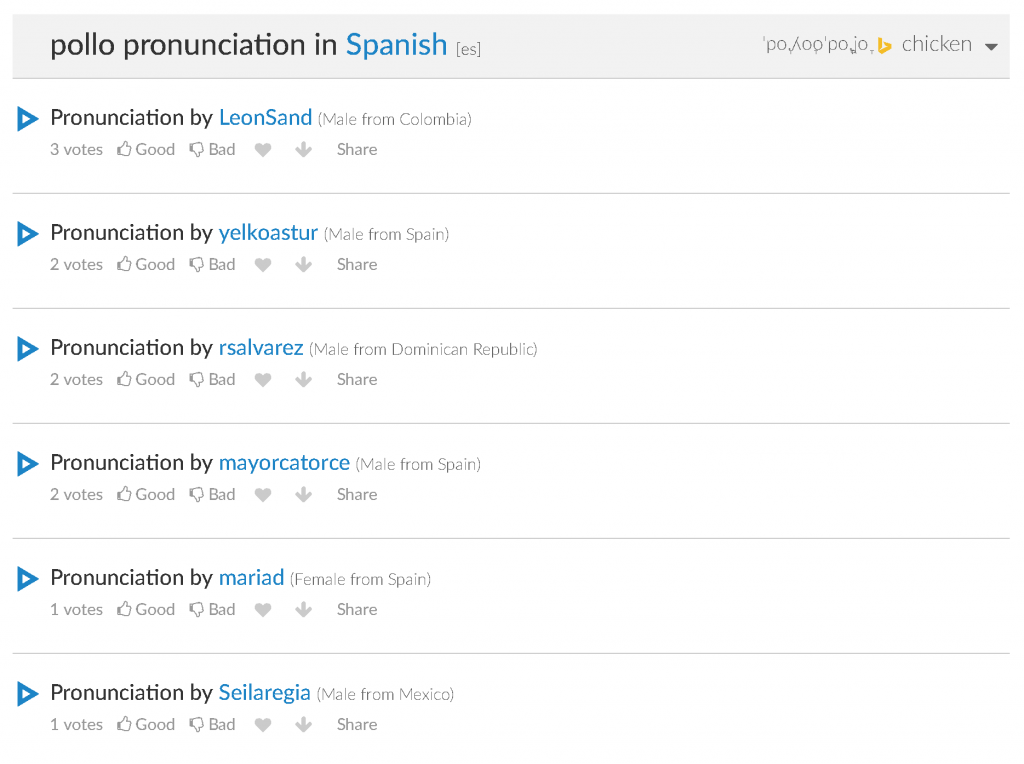How to Create a Language Hacker’s Cheat Sheet
By failing to prepare, you are preparing to fail. – Benjamin Franklin
Can you feel confident during your first conversation in another language?
I believe you can. Don’t get me wrong – feeling nervous is normal. But you can overcome this fear.
How?
A key factor is being prepared. In this post, I’m going to show you how to create a cheat sheet to help you prepare for your first conversation in a new language.
Proper Preparation Prevents Poor Performance
You’ve found a conversation partner or language tutor for your new language. And you’ve scheduled your first conversation.
What’s next? It’s time to prepare.
Being prepared will mean you can take full advantage of your time with your conversation partner.
Preparing starts a snowball effect. When you’re prepared, you speak with more confidence. And when you speak with confidence, you’ll have a more productive conversation. Which leads to your confidence growing even more!
See that positive snowball growing?
With good preparation, you can have your first conversation soon after you’ve started learning a new language. Maybe even within a few hours.
Will you speak perfectly? Probably not. But I’ve always found that having that first conversation early on helps me get a little more of a feel for the language and breaks some kind of invisible barrier.
While it might not necessary to speak so soon, I’ve always found it to be a good way to get the ball rolling and get me excited about learning more. Besides, most of us learn a language in order to speak it, right? Well, why not get into the fun of conversation from the very beginning?
Why I Use a Cheat Sheet to Prepare for Conversations in a New Language
When I’m preparing for that first conversation, I like to create a ‘cheat sheet’ I can study from to learn some basic introductory words and phrases. I do this because it means I can:
- Gather all the information I need in one place
- Keep the cheat sheet on hand in case I get stuck in my conversation!
- Use the template again and again to learn the basics in any language
So how do you prepare a cheat sheet for your conversations? Read on to find out what you need to learn and where you can find this information.
What Should You Learn Before Your First Conversation?
When choosing what words to learn, you need to think about the kind of conversation you want to have.
If this is your first conversation in your target language, you’re likely to focus on introducing yourself and on asking introductory questions to your conversation partner. That’s the conversation we’re going prepare in this article, but obviously the techniques that I write about could be applied equally well to conversations on any subject. I’ve used the same methods to prepare for conversations about subjects as varied as food and technology, so talk about what you like talking about!
So, let’s assume this is your first conversation. What’re the first things you usually talk about when you meet somebody new? Most of us talk a little bit about ourselves and ask a little bit about the other person. No matter what language you’re speaking, you’ll find yourself having some form of this conversation over and over again.
So let’s consider what phrases you need to learn for this kind of conversation.
Run through the conversation in your mind in English and note down what information you want to be able to share and ask for. Why not grab a pen and paper and jot some ideas down now? Here are some of the main things I always have at the top of my list:
- Hello
- How are you?
- My name
- My profession
- Where I’m from
- Where I live
- My interests
- Why I’m learning [target language]
- How to ask about the other person their name, profession, nationality and interests
- This is my first conversation in …. [language].
Already you can see how we could start to form a short four or five minute conversation from this material!
The Must-Ask Questions for Your Cheat Sheet
Conversations are a two-way street! As well as talking about yourself, you’ll need to ask questions.
Make sure that if you learn how to say something about yourself, you also learn how to ask your partner the same thing. This helps extend the conversation, and makes the conversation more like one you’d have in your native tongue.
Don’t worry if you can’t remember all of the questions you need; in most languages a simple ‘and you?’ will work perfectly when you’re stuck. For example, you might say something like ‘I’m from Ireland. And you?’ This little catch-all phrase is super useful and it sounds really natural too. And in most languages it’s as simple as learning two or three little words!
Your “Get Out of Jail Free” Phrases
I also like to have another section on my cheat sheet for what I call the ‘Get Out of Jail Free’ phrases!
These are the phrases I use when I need to say that I don’t understand something or ask the other person to repeat a word.
These phrases will get you out of tricky situations over and over again. They keep you in control of the conversation even if you can’t remember or don’t understand something. Here are some of the main ones I always learn:
- How do you say …. in [target language]?
- I don’t understand
- Can you repeat that please?
- Can you speak more slowly please.
- Can you type that for me please? (If you’re talking on Skype)
Where Can You Find the Words and Phrases for Your Cheat Sheet?
Once you’ve thought about your script in English, the next step is to actually find out how to say these things in your target language!
There are lots of different sources you can use and which one you choose doesn’t really matter. Just make sure you get your translations from a source you trust and that you know has been checked by native or proficient speakers of the language.
For this reason, Google Translate is not something I would suggest relying on! It’s really useful as a quick tool for checking words and phrases, but it’s not something to depend too much on because the translations are provided by a computer, with contributions from users who may not always know what they’re doing.
Most of us work with some kind of textbook or self-study book when we begin learning a new language, so if you have one of these it’s a great starting point for looking up these phrases. I’ve used both Teach Yourself and Colloquial books as sources for looking up words and phrases for past conversations. I know they’ve been double and triple checked by editors and native speakers so I can steal introductory phrases from them without having to worry!
Another source that I use every time I’m preparing one of these cheat sheets is Omniglot. This amazing site is an online encyclopedia of languages and it has a great section on useful phrases that you can use to look up what you need.

On Omniglot there are about 250 languages to choose from so you’ll almost certainly find what you need for the language you’re learning! Best of all, Omniglot also contains audio for a lot of the phrases so you can hear how they sound.
What if You Can’t Find a Phrase that You Need?
What should you do when you need to use a sentence that you can’t find in a book or on a site like Omniglot? There’s a good chance this will happen. A phrase like ‘I’m learning Russian because I’m interested in Russian history’ probably isn’t going to be in your book or on Omniglot.
Every language is different, which is why you can’t just look up words and piece them together using Google Translate. This is where you need to recruit the help of a native speaker.
The first thing I’ll do is look up the words I need myself and try my best to piece together a version of the sentence I want to learn. Once I’ve done this, I’ll try to get it corrected by a native speaker. There are lots of places you can get help with this, but my favourite is Facebook because you normally get a quick response!
Facebook can be a good option for rapid corrections. There are so many great groups for language learners and in most of them people will be very happy to help you out. Search for a group for learners/teachers of your target language and leave a short post asking if anyone can help you correct your phrases. If you’ve posted in an active group, you’ll be amazed by how many helpful people will be happy to respond!
I normally start by noting down the words and phrases I want to learn in a notebook. As I add more phrases, I start to create dialogues using these phrases to help get an idea of how the conversation might go.

Once I’ve drawn up this ‘paper’ version, I’ll get it checked by a native speaker using the resources I discussed above. Finally, I like to create a digital cheat sheet that I can print out and keep beside me during my conversation.

Note: I’ve included a free PDF cheat sheet template you can download at the end of this article that you can fill out in advance of your first conversation.
The reason I write out my notes on paper first is that is helps me bring extra attention to the words I’m learning and get them to stick in my memory.
It’s also very useful to write out your dialogues in advance so that you begin to get a feel for the likely structure of the conversations you’re going to have. Seeing the phrases as building blocks in the context of a conversation makes them easier to learn.
Get Your Pronunciation Right With This Simple Trick
Learning a new language doesn’t just mean learning new words and grammar. It also means learning a new sound system and sometimes even a new alphabet! Before you start memorising the words from your cheat sheet it’s essential that you know how they sound. You don’t want to waste your time learning how to say them the wrong way!
If you used Omniglot to look up your phrases, you’ll be able to access audio recordings simply by clicking on the phrases on the website.
But what do you do if you can’t find the audio you need there? My favourite pronunciation tool is Forvo. This amazing website is, quite simply, a pronunciation dictionary. Want to know how a word is pronounced? Just type it into Forvo and you’ll be given a list of recordings made by native speakers that you can listen to!

How to Memorise New Words and Phrases
One of the biggest challenges many of us face when learning a language is memorising new vocabulary. There are just so many new words to learn and sometimes it can seem completely overwhelming.
There are so many different (and effective) approaches you can use to learn new words, but for the purposes of this post, I’m going to focus on on mnemonics.
What are mnemonics? Mnemonics are words, associations or images that you use to memorise things. These images can be as simple or as complex as you like but the most important thing is that they help you remember three key elements of a word:
- The word itself
- Its meaning
- Its sound.
Here’s a recent mnemonic I created to help me remember the Russian word Брони́ровать (Branerovat), which means ‘to book’:
Emperor Nero eating Bran flakes from a giant vat (like a huge cauldron) while booking a room for his holidays in on his laptop.

Image credit: cjh1452000 on Wikipedia
The word itself and its sounds come from 3 different words or elements that I’ve included in my mnemonic: Nero, bran and vat; the meaning comes from the action that Nero is taking.
Is it a ridiculous image? Of course. But the more ridiculous and vivid your mnemonics are, the more likely you are to remember them and the words they represent. Don’t be afraid to make your mnemonics a little crude or violent – it makes them stick in your mind even more. I’ve found Looney Tunes-style cartoon violence (ACME anvils and dynamite galore!) to be particularly effective for making my mnemonics vivid.
The “Talk to Yourself” Technique for Practising Conversations
A great way to get comfortable with what you’re learning is to practise the conversations with yourself. I like to create conversations in an ‘ask and answer’ format from the material in my cheat sheet. Once I’ve written out the conversation, I’ll practise it with myself in my mind.
This may sound silly but it’s actually incredibly effective!
By visualising yourself having the conversation you’re not only repeating the new vocabulary, but you’re preparing yourself mentally for the conversation. If you can visualise yourself speaking confidently, you’re going to have more confidence when it comes time to have the conversation for real!
You can also practise your pronunciation in advance by recording yourself on your phone. Listen to some audio of the words you want to pronounce and then recorded yourself copying these words.
Doing this will not only help you pronounce words more correctly, but it will help you sound more natural too. The reason we sometimes struggle to say words correctly when we speak foreign languages is that they use a different variety of sounds to our own.
As an example, this is why the French ‘R’, the uvular consonant, is difficult for English speakers. This sound doesn’t exist in our language so it takes us time to actually build up the muscle memory to be able to produce it correctly. Copying the pronunciation of native speakers and recording yourself is a good way to get used to sounds like this and iron out any major mistakes you’re making in your speech.
Time to Speak! Get Ready to Use Your Cheat Sheet
Now that you have your cheat sheet ready and you know how to say the phrases on it, it’s time to schedule your first conversation.
There are plenty of ways and places to do this but I generally prefer to hire a tutor on Preply for my first few conversations.
If you don’t want to pay or are not in a position to do so, you can try setting up a language exchange instead, but I do feel that working with tutors is the best option. I have two main reason for this:
- You spend all of your time speaking in your target language, whereas in an exchange you only get to practise for half of the time.
- Community tutors normally give you more feedback and correction than a language exchange partner but they’re cheaper than professional teachers.
I like to contact a few tutors to explain why I’m learning the language and how I want to approach it. Then when they get back to me, I’ll choose the one who best matches my needs and learning style and book that first session!
Stop Trying to be Perfect – Communicate!
Communication is more important than perfection.
Don’t get me wrong, we all want to speak as fluently and correctly as possible, but in reality languages are about communication, not perfection. In fact, I’d go as far as to argue that perfect fluency in a language doesn’t even exist. Languages are living breathing mediums that are evolving constantly.
You’ve created your cheat sheet and learned the phrases you need. The next step is to simply take action and have a conversation in your target language – perfect or imperfect. After all, the only way to get better is by making a few mistakes along the way. And besides, you can always keep your cheat sheet on hand in case you get stuck!
Want to create your own cheat sheet? Sign up below, and we’ll send you the Fluent in 3 Months cheat sheet template to get you started.



Social